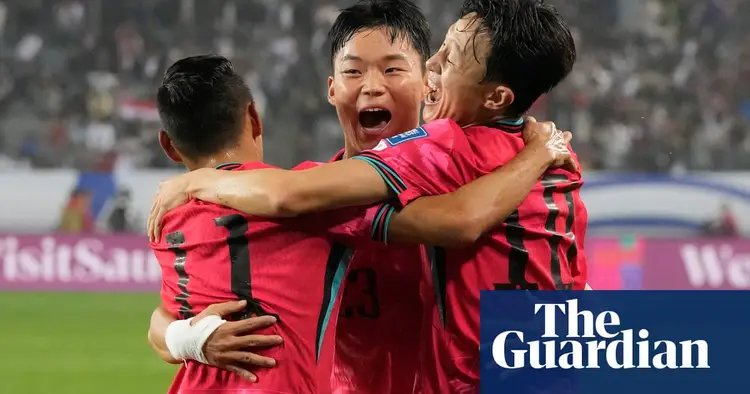South Korea on course for 2026 World Cup while rivals North Korea struggle

In June 2009, as Iran visited Seoul following South Korea's qualification for the World Cup, Park Ji-sung netted a late goal that led to a 1-1 tie. This goal was particularly appreciated by the North Korean team, who were in their hotel in Riyadh preparing for their match against Saudi Arabia.
“Park Ji-sung provided us with the most incredible assist,” North Korean forward Jong Tae-se shared in a Guardian interview several months later. “He gave us an amazing opportunity. It was thrilling. We realized we only needed a tie, and I believed we could achieve it in Saudi Arabia.” The match concluded with a score of 0-0, allowing North Korea to qualify for South Africa, bringing joy not only to Pyongyang but also to Seoul.
The qualification campaign concluded with an unforgettable moment in Shanghai back in 2008. Following a dull 0-0 match—Korean derbies tend to be quite uneventful—Park and his teammates showed their appreciation by bowing to the fans dressed in white, who responded with a heartfelt cheer. Even the most skeptical Chinese reporters present couldn’t help but feel a bit moved, speculating about the possibility of a similar connection arising between China and Taiwan in the future.
At the time, Jong's teammate Ahn Yong-hak was part of the K-League team Suwon Bluewings, which was owned by Samsung, a prime example of southern capitalism. A few years later, Jong, who was always well-liked south of the 38th parallel, would enjoy three successful seasons with the same team. However, it wasn’t all smooth sailing: the matches were held in Shanghai because the North wouldn’t allow the South’s flag or anthem to be displayed in Pyongyang. Later, after a 1-0 loss in Seoul, their coach Kim Jong-hun, dressed in a trench coat, claimed that the home team had poisoned his players.
However, the reality is quite different now. It's difficult to envision any shared celebrations if both teams qualify for North America in 2026. Just hours before North Korea participated in the fourth match of the third round of qualification on Tuesday, they destroyed the roads connecting the two nations, which remain technically at war since the ceasefire that concluded the Korean War in 1953. This act was as symbolic as it gets, highlighting the severe deterioration of relations between them.
It seems unlikely that either the "Chollima" or the "Taeguk Warriors" will qualify for the 2026 World Cup. On Tuesday, North Korea visited Kyrgyzstan with only two points, fully aware that a victory would have greatly improved their chances of finishing in at least third or fourth place. The 2026 World Cup will see an increase in automatic slots for Asia, with eight available: six will go to the top two teams in each of the three groups, while third and fourth place teams will have an opportunity to progress to the next round where two additional spots are up for grabs. However, North Korea lost 1-0 and now finds itself at the bottom of the standings.
Uzbekistan and Iran secured victories over the United Arab Emirates and Qatar, respectively, allowing both teams to accumulate 10 points. They now hold a six-point lead over the two Gulf countries, which are currently in third and fourth place.
Losing to a team like Kyrgyzstan, who had not scored any points before, was a tough setback for North Korea. They played better overall, but couldn't turn that edge into a win. With important matches against the top two teams coming up next month, the outlook is grim. Not having the benefit of playing at home is a disadvantage. In the last round, Pyongyang announced that it wouldn't be able to host the match against Japan in March due to concerns about contagious diseases. Currently, the team is playing their matches in Laos. Moving back to Kim Il Sung Stadium could really impact their performance.
South Korea is on track to qualify for the 2026 World Cup, which would mark their remarkable 11th consecutive appearance in the tournament. Only Brazil, Germany, Argentina, and Spain have had longer streaks. However, there have been troubles in Seoul as well, particularly a warning from FIFA last month about a possible ban after the government urged the Korea Football Association to improve its situation. In essence, the national team has been struggling to recover from a disappointing year under Jürgen Klinsmann, which concluded with a 2-0 loss to Jordan in the Asian Cup semi-finals in February.
Last Thursday, the team faced Jordan without Son Heung-min, who was sidelined due to injury, and lost Hwang Hee-chan to injury just 20 minutes into the match. Despite these setbacks, they managed to secure a 2-0 victory, which was a strong showing in Amman—a tough place to compete in Asia. They continued their success with a close 3-2 win over Iraq at home. Currently, the Reds lead Group B by three points, ahead of Jordan and Iraq, while Oman, Kuwait, and Palestine will be vying for the fourth spot.
Group C presents a bit more of a challenge. Japan remains in a strong position, even after conceding their first points in a 1-1 home draw with an Australian team that embraced their role as the underdog and put in tremendous effort. The Samurai Blue currently hold 10 points, which is five points ahead of the Socceroos.
China still has a chance to secure fourth place, their stated goal, after a tense 2-1 victory over Indonesia in front of an enthusiastic audience in Qingdao. Although this win doesn't move Team Dragon off the last spot, it brings a glimmer of hope after three losses. In challenging times like these, hope can be hard to come by, both on and off the field.

































































